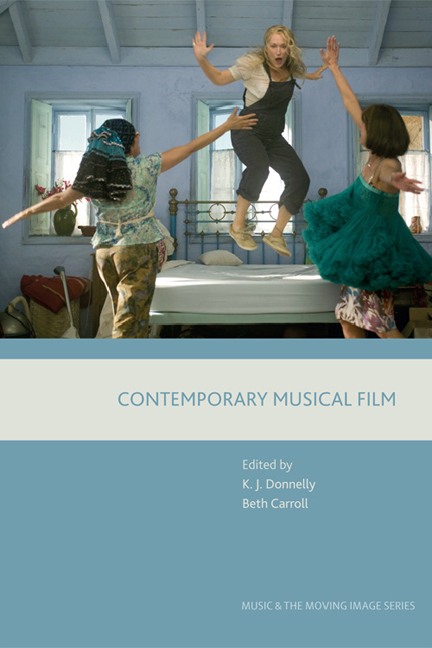Book contents
- Frontmatter
- Contents
- Illustrations
- Contributors
- Introduction: Reimagining the Contemporary Musical in the Twenty-first Century
- PART ONE ORIGINAL MUSICALS
- PART TWO STAGE TO SCREEN
- PART THREE MUSICALS BY ANOTHER NAME
- 9 O Brother, Where Art Thou?: The Coen Brothers and the Musical Genre Contamination
- 10 Racing in the Beat: Music in the Fast & Furious Franchise
- 11 Kill Bill: Quentin Tarantino as a Musical Filmmaker
- Index
9 - O Brother, Where Art Thou?: The Coen Brothers and the Musical Genre Contamination
from PART THREE - MUSICALS BY ANOTHER NAME
Published online by Cambridge University Press: 03 January 2018
- Frontmatter
- Contents
- Illustrations
- Contributors
- Introduction: Reimagining the Contemporary Musical in the Twenty-first Century
- PART ONE ORIGINAL MUSICALS
- PART TWO STAGE TO SCREEN
- PART THREE MUSICALS BY ANOTHER NAME
- 9 O Brother, Where Art Thou?: The Coen Brothers and the Musical Genre Contamination
- 10 Racing in the Beat: Music in the Fast & Furious Franchise
- 11 Kill Bill: Quentin Tarantino as a Musical Filmmaker
- Index
Summary
There is little doubt that music plays a crucial role in the Coen Brothers’ oeuvre, both when considering the ‘scored’ original music built around the characters, and also when we think of the recurring diegetic performances of onscreen musicians. Their films are characterised by soundtracks that strongly intertwine with the narrative, to the extent that specific songs are already present at the screenplay stage. The songs often create an ironic commentary to the scenes – as so called ‘music-puns’ – and strongly contribute to the feeling of temporal and spatial displacement, as well as the overall intertextual mash-up typical of the brothers’ postmodern style.
Since their debut film Blood Simple (1984), the Coen Brothers have developed a recurring collaboration with score composer Carter Burwell and more occasionally, albeit very significantly, a professional relationship with musician and soundtrack producer T-Bone Burnett, which began with The Big Lebowski (1998), the first film to rely on pre-existing music. As such, the use of popular music in the Coens’ films remains one of their distinctive stylistic traits, mirroring the complexity of their work and attracting critical recognition, in particular assigning an authorship role to Burwell, and interdisciplinary scholarly attention. Among others, Jeff Smith rightly claims that, ‘although popular music certainly contributes to the winking, ironic tone of the Coen brothers’ films, it also serves very conventional storytelling functions by reinforcing particular settings, underlining character trait, and establishing mood and tone for specific scenes’.
These storytelling functions of the music tracks are the focus of this chapter, in particular how they play alongside the other principal narrative frame characteristic of the Coens’ cinema: that of film genre. In order to explore these elements, I propose to ideally organise their films according to the use of music, dividing their works into three overleaping categories: ‘scored’, ‘sound-driven’ and ‘tracked’. After considering the role that film genres play in their cinema, this chapter eventually investigates their engagement with the classical musical film genre.
- Type
- Chapter
- Information
- Contemporary Musical Film , pp. 143 - 156Publisher: Edinburgh University PressPrint publication year: 2017



